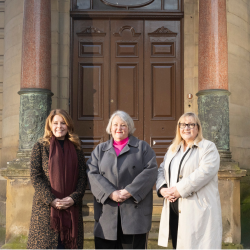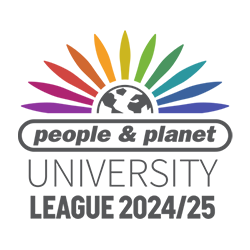-
Study
-
Undergraduate
- Search for a Course
- Undergraduate Open Day & Events
- Application Guides
- Northumbria University UCAS Exhibitions
- Foundation Years
- Undergraduate Fees & Funding
- School & College Outreach
- Continuing Professional Development
-
Postgraduate
- Postgraduate Study Degree
- Postgraduate Research Degrees
- Postgraduate Open Days and Events
- Postgraduate Fees & Funding
- Flexible Learning
- Thinking about a Masters?
- Continuing Professional Development
- Change Direction
-
Student Life
- The Hub - Student Blog
- Accommodation
- Life in Newcastle
- Support for Students
- Careers
- Information for Parents
- Students' Union
- Northumbria Sport
- Be Part of It
-
-
International
International
Northumbria’s global footprint touches every continent across the world, through our global partnerships across 17 institutions in 10 countries, to our 277,000 strong alumni community and 150 recruitment partners – we prepare our students for the challenges of tomorrow. Discover more about how to join Northumbria’s global family or our partnerships.
View our Global Footprint-
Applying to Northumbria
- European Union
- Our London Campus
- Northumbria Pathway
- International Events
- Entry Requirement and Education Country Agents
- Global Offices
-
Northumbria Language Centre
- Faculty Requirements
- Acceptable English Requirements
- Pre-sessional English Language and Study Skills
- Academic Language Skills Programmes (ALS)
-
International Fees, Funding & Scholarships
- International Undergraduate Fees
- International Undergraduate Funding
- International Masters Fees
- International Masters Funding
- International Postgraduate Research Fees
- International Postgraduate Research Funding
- International Money Matters
-
Life at Northumbria
- International student support
- Careers
-
International Mobility
- Current Northumbria Students
- Incoming Exchange Students
-
-
Business
Business
The world is changing faster than ever before. The future is there to be won by organisations who find ways to turn today's possibilities into tomorrows competitive edge. In a connected world, collaboration can be the key to success.
More on our Business Services -
Research
Research
Northumbria is a research-rich, business-focused, professional university with a global reputation for academic quality. We conduct ground-breaking research that is responsive to the science & technology, health & well being, economic and social and arts & cultural needs for the communities
Discover more about our Research -
About Us
-
About Northumbria
- Our Strategy
- Our Staff
- Place and Partnerships
- Student Profiles
- Alumni Profiles
- Leadership & Governance
- Academic Departments
- University Services
- History of Northumbria
- Contact us
- Online Shop
-
-
Alumni
Alumni
Northumbria University is renowned for the calibre of its business-ready graduates. Our alumni network has over 246,000 graduates based in 178 countries worldwide in a range of sectors, our alumni are making a real impact on the world.
Our Alumni - Work For Us
What will I learn on this module?
This module will introduce you to contemporary concepts and creative studio production processes related to the theme of the ‘Body’.
You will learn to develop and produce a range of experimental collaborative and individual artworks under the direction of academic staff from across subject disciplines. Through directed and self-directed approaches around a range of studio and workshop practices you will produce a portfolio of work that offers a personal reflection on a subject that has fired the imagination since the first humans established their presence through paintings on cave walls, collective performance or carvings into rocks.
You will learn to understand the importance of primary research from source and the application of collaborative interdisciplinary practices.
The Body is a complex subject and you will be engaged in a number of learning situations that will build your awareness and understanding of critical engagement and reflective thinking through creative practice.
You will develop a greater knowledge of how the Body has been the catalyst for artists producing paintings, sculpture, live art performances, drama, dance, text, photography and film; and be introduced to the theoretical debates such as body politics, feminism and ethics.
Working in a team you will further learn from each other’s practices and creative interventions through experimentation, making and discussion. This will enable you to build confidence in outlining your own views and position.
Creative practitioners have often looked to artists in the past to inspire new directions in their own work. In this module you will be asked to identify a specific artwork inspired by the Body theme and transcribe it in your own terms. This is a valuable learning tool in research and development leading to a final output. The transcription project will aid you develop a more personal direction that will inform the Identity module in semester 2.
How will I learn on this module?
The module encourages you to examine existing artworks that will be the platform for rigorous investigation and experimentation. You will do this both individually and collectively in small groups.
You will learn how to recognise the fundamental principles of drawing as a research tool and drawing in a verbal context as a way of seeing, extracting information, revealing new meaning and articulating your ideas. This will take place while you are learning new technical processes around studio production and workshop induction (body casting, printmaking, physical theatre and movement, voice, drawing from life). You will also be introduced to how artists use material form in their production and search for material content in their creative practice.
Study visits to the clinical study lab at the medical school will provide you with a privileged insight into the complexities of anatomy and introduce discourse about how artists have examined concepts around life and mortality.
You will be given formative feedback on your work to support your development towards a final output which along with your research material will inform a final assessment.
How will I be supported academically on this module?
You will be supported through guided studio and workshop activity by your academic tutors and technical support staff.
The module handbook provides details of sessions, reading lists and assessment criteria. Teaching and learning materials are made available on the e-learning portal. The module tutors will be available in taught sessions, as well as in feedback and consultation hours and on email, to discuss any queries or concerns you have about how to excel academically on the module. Moreover, feedback on formative work and the first summative assessments will also serve as ‘feed forward’, giving guidance on how to improve during the module. Given that this is one of the first studio based modules to be completed you will be guided through how assessment impacts on your learning, and how the learning achieved in the associated Body module this semester informs and shapes your practice.
In addition, you have a designated Personal Guidance Tutor throughout the entire duration of your programme. The academic side of the Personal Guidance Tutor’s role includes:
• monitoring your ongoing academic progress
• helping you to develop self-reflection skills necessary for continuous academic development
• directing you to further available services which can help them with their academic skills (e.g. Library’s Skills Plus)
You are advised to see your Personal Guidance Tutor at least twice each semester to review your academic progress.
What will I be expected to read on this module?
All modules at Northumbria include a range of reading materials that students are expected to engage with. Online reading lists (provided after enrolment) give you access to your reading material for your modules. The Library works in partnership with your module tutors to ensure you have access to the material that you need.
What will I be expected to achieve?
Knowledge & Understanding:
1. Be able to demonstrate an understanding of the Body as a subject in historical and contemporary art practice
Intellectual / Professional skills & abilities:
2. To develop an ability to research source material as a catalyst for studio practice development, production and critical reflection
Personal Values Attributes (Global / Cultural awareness, Ethics, Curiosity) (PVA):
3. Greater appreciation of societal values, ethics and how the body in contemporary art remains a pertinent subject
How will I be assessed?
Formative Assessment
Formative feedback is provided as an integral part of teaching and learning sessions
Summative Assessment
• Portfolio submission of research and a final output responding to the theme of The Body. Portfolio submission to include presentation of artwork, evidence/documentation of historical and contemporary thematic research from the Body (MLO1 and 3) and developing skills in drawing/articulating creative enquiry, collaborative studio activity and transcription of an original artwork (MLO2),.
Pre-requisite(s)
N/A
Co-requisite(s)
Arts portfolio: Skills for University AD3021
Art and the City: AD 3018
Module abstract
The subject of the Body continues to inspire contemporary artists working across a range of visual and performing practices. This module provides you with an opportunity to develop your own work in responce to important historical and contemporary contexts. Working both individually and collaboratively you will develop and produce a new portfolio based on your engagement with studio activities. Engagement with the rich research topics for this module is a critical, embedded learning outcome designed to develop your ability to recognise and identify source information as you explore, interrogate and examine the function and value of drawing. Drawing reference from an exisiting historical or contemporary artwork, linked to the Body theme, you will also produce a personal evaluation and transcription.
Course info
UCAS Code W150
Credits 20
Level of Study Undergraduate
Mode of Study 4 years Full Time or 5 years with a placement (sandwich)/study abroad
Department Northumbria School of Design, Arts and Creative Industries, Arts
Location City Campus, Northumbria University
City Newcastle
Start September 2025
All information is accurate at the time of sharing.
Full time Courses are primarily delivered via on-campus face to face learning but could include elements of online learning. Most courses run as planned and as promoted on our website and via our marketing materials, but if there are any substantial changes (as determined by the Competition and Markets Authority) to a course or there is the potential that course may be withdrawn, we will notify all affected applicants as soon as possible with advice and guidance regarding their options. It is also important to be aware that optional modules listed on course pages may be subject to change depending on uptake numbers each year.
Contact time is subject to increase or decrease in line with possible restrictions imposed by the government or the University in the interest of maintaining the health and safety and wellbeing of students, staff, and visitors if this is deemed necessary in future.
Useful Links
Find out about our distinctive approach at
www.northumbria.ac.uk/exp
Admissions Terms and Conditions
northumbria.ac.uk/terms
Fees and Funding
northumbria.ac.uk/fees
Admissions Policy
northumbria.ac.uk/adpolicy
Admissions Complaints Policy
northumbria.ac.uk/complaints














